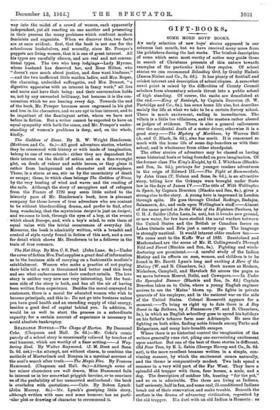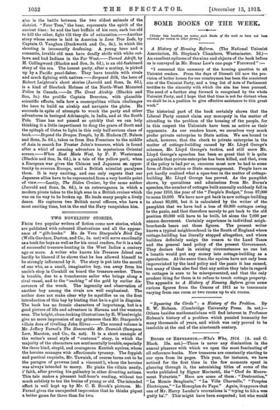GIFT-BOOK S,
SOME MORE OS' BOOKS.
AN early selection of new boys' stories appeared in our columns last month, but we have received many more from the publishers during the last weeks. The briefest description of some which seem most worthy of notice may guide those in search of Christmas presents of this nature towards examples of the particular kind they require. Of school stories we can recommend Schoolboy Grit, by Gunby Hadath (James Nisbet and Co., 3s. 6d.). It has plenty of football and cricket interest and description of school cliques. A somewhat novel point is raised by the difficulties of County Council scholars from elementary schools thrust into a public school of high standing. Of course, the snobs are demolished at the end. Sing of Banleigh, by Captain Brereton (S. W. Partridge and Co., 6s.), has some home life also, but describes mainly the life at what we take to be a certain Surrey school. There is much excitement, ending in incendiarism. The villain is a little too villainous, and the masters rather absurd as judges of evidence. There is also a general callousness over the accidental death of a motor driver, otherwise it is a good story.—The Mystery of Markham, by Warren Bell (A. and C. Black, 3s. Gd.), also has merit. It is concerned as much with the home life of some day-boarders as with their school, and is wholesome from either standpoint The other stories of adventure may be classed as having some historical basis or being founded on pure imagination. Of the former class The King's Knight, by G. I. W hitham (Blackie and Son, 2s. Gd.), portrays for younger readers adventures in the reign of Edward III.—The Fight at Summerdale, by John Gunn (T. Nelson and Sons, 3s. 6d.), is an attractive story, telling how the Orkneys were brought under Scots law in the days of James IV.—The title of With Wellington. in Spain, by Captain Brereton (Blackie and Son, 6s.), gives strong clue to the story. A young hero is impressed in London through spite. He goes through Ciudad Rodrigo, Badajos, Salamanca, &c., and ends upon Wellington's staff.—Almost of the same period is In the Wake of the Eighteen-Ttcelvers, by C. H. J. Snider (John Lane, 5s. net), but it breaks new ground, or new water, for few have studied the naval warfare between the United States and the British or Canadian forces on Lakes Ontario and Erie just a century ago. The language is strongly nautical. It would interest older readers too.— We come next to the Kaffir War of 1835. Basutoland and Mashonaland are the scene of Mr. H. Collingwood's Through Veld and Forest (Blackie and Son, 5s.). Fighting and witch- doctoring are prominent —A careful study of the Indian Mutiny and its effects on men, women, and children is to be found in Mr. Escott Lynn's long and exciting A Hero of the Mutiny (W. and R. Chambers, 5s.). Such names as Hodson, Nicholson, Campbell, and Havelock flit across the pages as we move between Meerut, Delhi, and Cawnpore.—In Under the Spangled Banner (Blackie and Son, 3s. 6d.) Captain Brereton takes us to Cnba, where a young English engineer arrives to see the Maine' blown up. He fights in private quarrels of his employer, and in the national war on the side of the United States. Colonel Roosevelt appears for a moment.—To bring ns right up to date there is A Boy Scout in tie Balkans, by J. Finnemore (W. and R. Chambers, 5s.), in which an English schoolboy goes to spend his holidays on his father's tobacco farm near Adrianople. He sees the fighting on both sides, finding noble friends among Turks and Bulgarians, and many hair-breadth escapes.
Where there is no historical control the imagination of the writers generally runs riot, piling one excruciating excitement upon another. But one of the best of these stories is different. Old Four Toes, by E. L. Sabin (George Harrap and Co., 3s. 6d- net), is the more excellent because written in a simple, con- vincing manner, by which the excitement comes naturally, and the theme is comparatively modest. Two lads spend a summer in a very wild part of the Far West. They have a splendid old trapper with them, four horses, a mule, and a dog. The description of outdoor life, hunting "for the pot," and so on is admirable. The three are living as Indians, half seriously, half in fun, and some real, ill-conditioned Indians break out of their reservation and make trouble. Beneath the surface is the drama of advancing civilization, regretted by the old trapper. His duel with an old Indian is Homeric : so
also is the battle between the two oldest animals of the district. " Four Toes," the bear, represents the spirit of the ancient time : he and the last buffalo of his race, each too old to kill the other, fight till they die of exhaustion.—Another story whose scene is laid in America is Lone Tree Lode, by Captain 0. Vaughan (Duckworth and Co., 6s.), in which the shooting is incessantly deafening. A young hero and a romantic, lovable old man have deadly strife with white out- laws and bad Indians in the Far West.—Turned Adrift, by H. Collingwood (Blackie and Son, 3s. 6d.), is an old-fashioned story of the sea. The honest party, after a mutiny, is picked up by a Pacific pearl-fisher. They have trouble with rivals and much fighting with natives.—Sergeant Silk, the hero of Robert Leighton's short stories (Jarrold and Sons, 2s. 6d.), is a kind of Sherlock Holmes of the North-West Mounted Police in Canada.—In The Great Airship (Blackie and Son, 5s.) the prolific Captain Brereton, with plausible scientific effects, tells how a cosmopolitan villain challenges the hero to build an airship and navigate the globe. He succeeds in spite of attempts to wreck the party and other adventures in besieged Adrianople, in India, and at the South Pole. Time has not passed so quickly that we can help thinking it a little impertinent to drag the grave of Scott and the epitaph of Oates to light in this only half-serious class of book.—Beyond the Dragon Temple, by R. Hudson (T. Nelson and Sons, 3s. 6d.), takes us from San Francisco to the middle of Asia in search for Preater John's treasure, which is found after a whirl of amazing adventure in mysterious Oriental scenes.—When East Meets West, by P. F. Westerman (Blackie and Son, 3s. 61), is a tale of the yellow peril, when a European war gives the Chinese and Japanese au oppor- tunity to overrun Europe, until a British scientist paralyses them. It is very exciting, and one only regrets that our Japanese allies have to be represented from a very hostile point of view.—Lastly, The Stolen Cruiser, by the same author (Jarrold and Sons, 3s. 6d.), is an extravaganza in which a modern pirate takes to the high seas in a British cruiser which was on its way to be broken up. He leads many people a lively dance. He captures two British naval officers, who have a most exciting time, but in the end the Navy vanquishes him.



























































 Previous page
Previous page